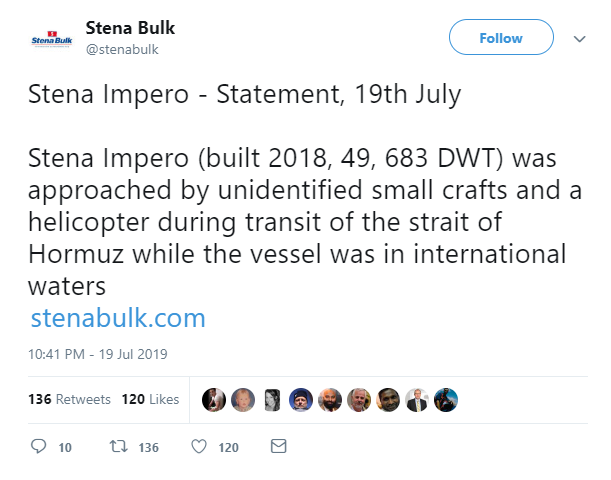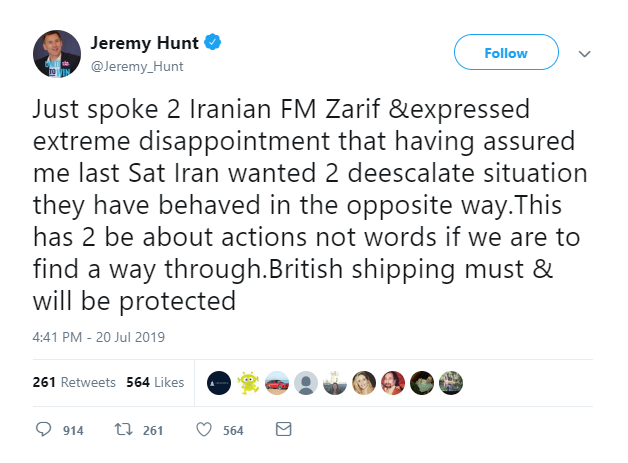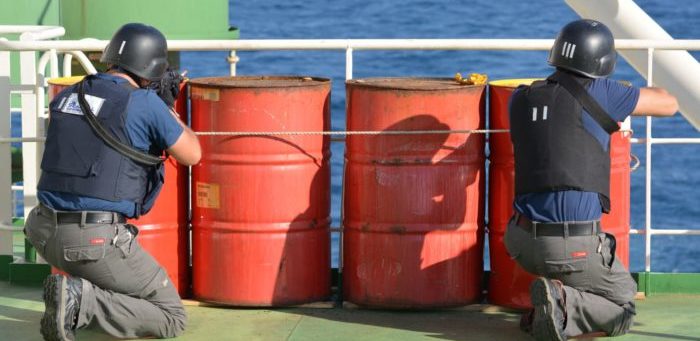On Friday, July 19, Iranian authorities seized Stena Impero, a British-flagged, Swedish-owned oil tanker, while sailing through the Strait of Hormuz. The incident spiked the tensions in the area, as the UK condemned this act as ‘hostile’, denying Tehran’s argument that it seized the vessel because it was involved in an accident.
- The Incident
According to a Tehran-based TV channel, Stena Impero was seized because it was breaching international maritime law, whereas, Iran’s Fars news agency stated that the Guards boarded on the Stena Impero after it collided with an Iranian fishing boat whose distress call it ignored.
Troops wearing ski masks and carrying machine guns rappelled to its deck from a helicopter.
It’s reported that the vessel turned off its AIS and ignored warnings by the IRGC before being boarded by the armed guards. In the meantime, the MR2 tanker reportedly failed to respond to a distress call sent by an Iranian fishing boat. Yet, as shown above, Iran’s Revolutionary Guards posted a video online showing speedboats pulling up alongside Stena Impero.
According to reports, the vessel was taken to the Iranian port of Bandar Abbas, where it will remain.
Also, Iran’s Ports and Maritime Organization (PMO) noted that the vessel had also been releasing oil residues from its tanks. Reuters reports that a spokesman for Iran’s Revolutionary Guards, Brigadier-General Ramezan Sharif, addressed that Tehran seized the ship in the Strait of Hormuz despite the ‘resistance and interference’ of a British warship which had been escorting it. However, there’s no British warship visible in the video published by the Guards.
The owner of the seized vessel, Stena Bulk, and ship manager, Northern Marine Management, both confirmed that the tanker was approached by a small naval craft and a helicopter at around 16:00 BST on July 19.

In addition, Stena Bulk tweeted on July 20
Further to our earlier statement, Stena Bulk and NMM can confirm that Swedish-owned vessel Stena Impero is no longer under the control of the crew and remains un-contactable.
- The UK talks of a ‘hostile action’ & US to cooperate with the UK
The vessel’s seizure has been condemned from the shipping industry, as the West believes that this incident worsens the increasing tensions in the area. France, Germany and the EU are in support of Britain, condemning the incident.
Penny Mordaunt, British Defence Secretary commented the incident a hostile act, whereas Foreign Secretary Jeremy Hunt tweeted that he expressed his extreme disappointment to his Iranian counterpart, Mohammad Javad Zarif.

On the day of the incident, Mr Hunt said the solution would be found via diplomacy and London was ‘not looking at military options.’ Britain’s government said it had advised British shipping to stay out of the Hormuz area for an interim period.
In the meantime, in support of the UK, US President, Donald Trump, stated during his departure from the White House
We have a very close alliance with the UK. I will be working with the UK.
Meanwhile, all UK vessels were ordered, by the UK Government, to avoid transiting the Strait of Hormuz for an indefinite period following Friday’s seizure.
- Norwegian Shipowners Association calls members to be on guard
The incident alerted the shipping industry which now calls all those sailing through the Strait of Hormuz to be extra careful.
Xhinua informs that John Hammersmark, Director of Security and Emergency Planning in Norway’s Shipowners’ Association, quoted to NRK that
We look at the situation very seriously and advise our members that there is a security threat in these waters and that they keep as good a distance as possible from Iranian waters.
As NRK stated, for the time being, there are 38 vessels with Norwegian ownership interests in the area and eight of them sail under the Norwegian flag.
- ‘Clear violation of international law’
Moreover, the UK Chamber of Shipping expressed its concerns over the incident, and commented that it’s obvious that the vessel was seized in ‘clear violation of international law.’
The chart released by Her Majesty’s government today clearly demonstrates that the Swedish-owned and British-flagged tanker, Stena Impero, was in Oman territorial waters when she was boarded by the Iranian Revolutionary Guard on Friday 19th July.
… added Bob Sanguinetti, CEO of the UK Chamber of Shipping.
Concerning the incident, ITF and Nautilus proposed that the situation should be solved in a diplomatic manner, in order to avoid further tensions and accidents.
He continued that this incident can’t be compared with the seizure of Grace 1, as the latter was seized under international law for the breach of EU sanctions.
- Background
In general, there has been an increasing tension between the US and Iran, keeping in mind the attacks in Gulf of Oman that took place kept the industry alerted for additional attacks.
The first incident that spiked the tensions, was in May, when the UAE said that four vessels were sabotaged at the Fujairah port. In light of London’s marine insurance market meeting, May 16, they decided to extend the list of waters deemed as high risk to include Oman, the United Arab Emirates and the Gulf after ship attacks off Fujairah.
Also, in June, the shipping industry was present in an additional attack that took place in the Gulf of Oman against two vessels. The IMO Secretary General, the International Chamber of Shipping and INTERTANKO expressed their concerns, noting that this is an intolerable situation threatening the lives of seafarers, the environment and the world economy.
Despite these attacks, UK Royal Marines seized the Iranian ‘Grace 1’, near Gibraltar over suspected breach of EU sanctions earlier in July, and could only be released if the UK is guaranteed the oil is not bound for Syria.
Concluding, the ongoing tensions in the area seem to be a challenge for the shipping industry to collaborate; Thus, Reuters provided a timeline of the events that feed the escalated tension among major state players, like US and Iran.

































































